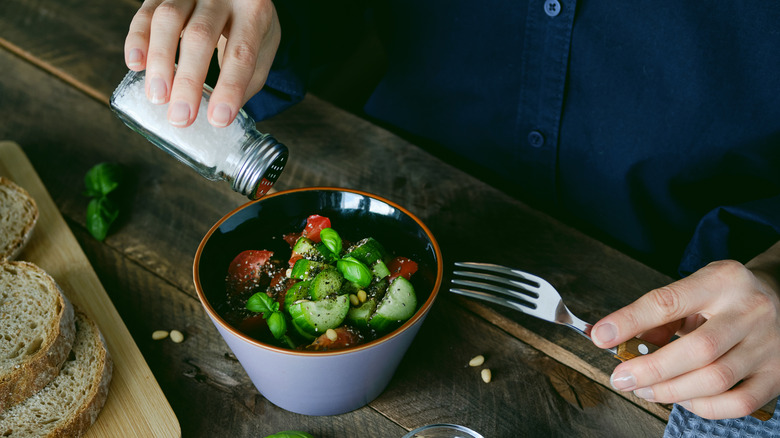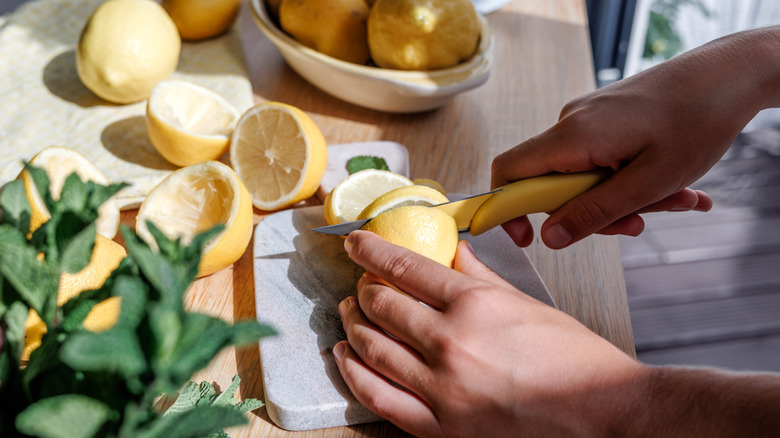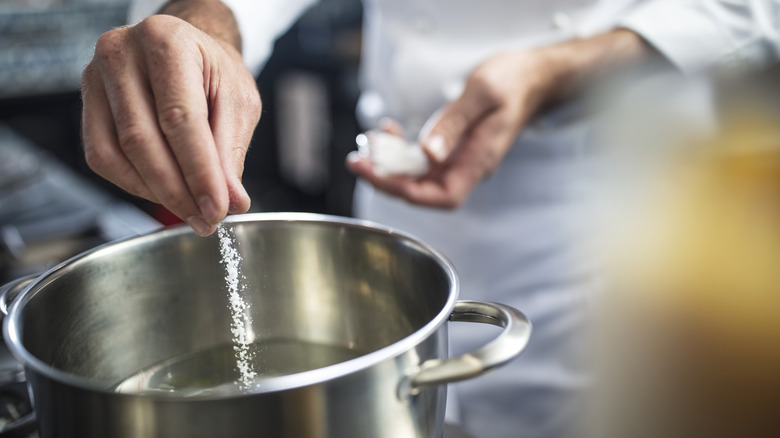Balance Out Over-Salted Food With A Spoonful Of Acidity
Salt is a necessity, not just for our bodies, but for flavorful dishes. Salt helps balance and enhance flavors (some people even add salt to coffee!). But sometimes, too much of a good thing can be bad — like when you oversalt a dish. Nothing short of adding more ingredients will reduce the sodium content in your dish. Even that old trick of adding a potato and removing it once it's cooked tends to have limited success.
So, if you can't bulk up the dish with extra ingredients, your best bet is to cover the taste with seasoning. Indiscriminately dumping oregano into the pot won't do, though. You have to be more intentional: certain flavors help mask the salty taste, while others don't. Sugar and dairy are both tried-and-true add-ins to help neutralize salty flavors, but can be difficult to incorporate. While a spoonful of maple syrup won't hurt a salty barbecue sauce, you wouldn't want to dump sugar into a savory fish stew.
Instead, turn to acids. Like sugar and dairy, a little extra acid hides your salt sins. But, while sugar and dairy have limited uses, acid is versatile: It works with sweet and savory dishes. Worried that more sugar will turn your cherry pie sickly sweet? Add a dash of lemon juice. Oversalted collard greens? Opt for vinegar — it's a classic addition anyway.
How to neutralize salt with acid
Remember to match your acid to your dish. Lemon juice is bright and versatile, but citrus isn't always the best choice. Vinegar comes in a wide range of flavors that make it easy to match with your dish. Vegetable soup? Add more tomato. Balancing your dish with sweet or sour? Consider honey. While honey probably isn't on your acid radar, it has a 3.9 pH — more acidic than many foods known for their acid content, like tomatoes or coffee.
Sometimes, you can't add any more liquid to a dish. That's why it pays to keep powdered acids in your kitchen. Many cooking acids come in powdered forms, which you can buy in bulk online. Powdered acids won't add extra liquid, and they're easier to hide. If you're afraid that lemon will overwhelm a delicate dish, opt for powdered acid — it'll have a cleaner, purer flavor.
Not all dishes can handle extra acid. Acid can screw up the chemical reactions that make magic happen. Be especially careful with baked goods: with baking, precision is important. Avoid adding acids unless the recipe already calls for them, and be careful about adding too much liquid.
How to avoid oversalting
The easiest way to avoid oversalting? Use moderation and taste along the way. Take a tip from professional chefs and salt in layers, tasting as you add ingredients. The method helps you understand how salt interacts with each new addition. Many people prefer adding salt to taste instead of going by a recipe, but dumping salt into a dish makes for disaster. Pour it out on the side, then sprinkle it in bit by bit. Adding salt directly makes it hard to see how much you've added, and a slip of the hand could dump half a shaker into your dish.
Remember your ingredients. Super-salty ingredients like salt pork, sardines, or pickles make it easy to oversalt a dish. Some dishes, like puttanesca sauce — the naughtily-named red sauce that blends capers, olives, and sardines — may not need any extra salt.
Paying attention to ingredients means considering the kind of salt you're using, too. Salt is not created equal: sea salt, table salt, and Kosher salt vary in saltiness, and some brands are saltier than others. If your recipe calls for a specific kind of salt, don't switch it up. Sometimes, salt happens despite your best efforts. Instead of letting an oversalted dish ruin a dinner party, take some advice from Julia Child and avoid apologizing for the food. We're often our own worst critics, so don't call attention to it. Your guests may not notice at all.


